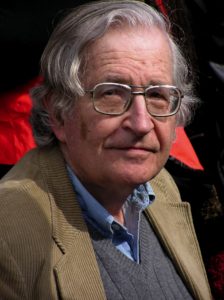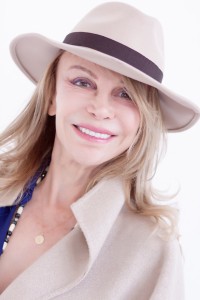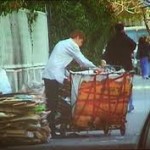Printing A Book, Old School
Global Warming And The Future Of Humanity: An Interview With Noam Chomsky And Graciela Chichilnisky
truth-out.org. September 2016. How serious of an issue is climate change? Does global warming really threaten human civilization? Can it be reversed, or is it already late?
In this interview for Truthout, two scholars, Noam Chomsky, one of the world’s leading public intellectuals, and Graciela Chichilnisky, a renowned economist and climate change authority who wrote and designed the carbon market of the Kyoto Protocol, concur on a few key points. First of all, global warming and climate change constitute the greatest challenge facing humanity, and may pose an even greater threat to our species than that of nuclear weapons. Secondly, the operations of the capitalist world economy are at the core of the climate change threat because of over-reliance on fossil fuels and a perverse sense of economic values. Thirdly, the world needs to adopt alternative energy systems as quickly as possible. And finally, it is crucial to explore technologies to assist us in reversing climate change — as time is running out.
C. J. Polychroniou: A consensus seems to be emerging among scientists and even political and social analysts that global warming and climate change represent the greatest threat to the planet. Do you concur with this view, and why?
Noam Chomsky: I agree with the conclusion of the experts who set the Doomsday Clock for the Bulletin of Atomic Scientists. They have moved the Clock two minutes closer to midnight — three minutes to midnight — because of the increasing threats of nuclear war and global warming. That seems to me a credible judgment. Review of the record shows that it’s a near miracle that we have survived the nuclear age. There have been repeated cases when nuclear war came ominously close, often a result of malfunctioning of early-warning systems and other accidents, sometimes [as a result of] highly adventurist acts of political leaders. It has been known for some time that a major nuclear war might lead to nuclear winter that would destroy the attacker as well as the target. And threats are now mounting, particularly at the Russian border, confirming the prediction of George Kennan and other prominent figures that NATO expansion, particularly the way it was undertaken, would prove to be a “tragic mistake,” a “policy error of historic proportions.”
As for climate change, it’s by now widely accepted by the scientific community that we have entered a new geological era, the Anthropocene, in which the Earth’s climate is being radically modified by human action, creating a very different planet, one that may not be able to sustain organized human life in anything like a form we would want to tolerate. There is good reason to believe that we have already entered the Sixth Extinction, a period of destruction of species on a massive scale, comparable to the Fifth Extinction 65 million years ago, when three-quarters of the species on earth were destroyed, apparently by a huge asteroid. Atmospheric CO2 is rising at a rate unprecedented in the geological record since 55 million years ago. There is concern — to quote a statement by 150 distinguished scientists — that “global warming, amplified by feedbacks from polar ice melt, methane release from permafrost, and extensive fires, may become irreversible,” with catastrophic consequences for life on Earth, humans included — and not in the distant future. Sea level rise and destruction of water resources as glaciers melt alone may have horrendous human consequences.
Graciela Chichilnisky: The consensus is that climate change ranks along with nuclear warfare as the top two risks facing human civilization. If nuclear warfare is believed to be somewhat controlled, then climate change is now the greatest threat.
As difficult as it is to eliminate the risk of nuclear warfare, it requires fewer changes to the global economy than does averting or reversing climate change. Climate change is due to the use of energy for industrial growth, which has been and is overwhelmingly based on fossil fuels. Changing an economic system that is bent on uncontrolled and poorly measured economic growth and depends on fossil energy for its main objectives, is much more difficult than changing how nuclear energy is used for military purposes. Some think it may be impossible.
Joseph Conrad Collection
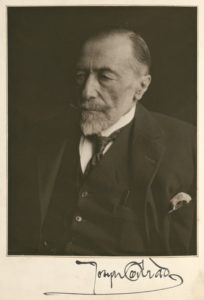 Joseph Conrad was born to Polish parents in 1857 in Berdychiv, which is part of modern Ukraine. As a young man he spent 19 years as a merchant marine sailing on French and British ships. His years at sea and the various persons he encountered served as inspiration for events and characters in his subsequent literary career. English was his third language (after Polish and French), which imbues his writing with a distinct style.
Joseph Conrad was born to Polish parents in 1857 in Berdychiv, which is part of modern Ukraine. As a young man he spent 19 years as a merchant marine sailing on French and British ships. His years at sea and the various persons he encountered served as inspiration for events and characters in his subsequent literary career. English was his third language (after Polish and French), which imbues his writing with a distinct style.
The Joseph Conrad collection contains manuscripts, letters, documents, and photographs. Of particular significance are manuscripts for several of his novels, including Almayer’s Folly (1895), Chance (1913), and Victory (1915). His outgoing correspondence includes letters to Henry D. Davray, Norman Douglas, Henry James, Alfred A. Knopf, and others.
Incoming correspondence has been excluded from this online collection due to copyright concerns.
This collection was digitized as part of Project REVEAL (Read and View English & American Literature).
Go to: http://hrc.contentdm.oclc.org/
Joseph Conrad ~ Nostromo
Author’s Note
“Nostromo” is the most anxiously meditated of the longer novels which belong to the period following upon the publication of the “Typhoon” volume of short stories.
I don’t mean to say that I became then conscious of any impending change in my mentality and in my attitude towards the tasks of my writing life. And perhaps there was never any change, except in that mysterious, extraneous thing which has nothing to do with the theories of art; a subtle change in the nature of the inspiration; a phenomenon for which I can not in any way be held responsible. What, however, did cause me some concern was that after finishing the last story of the “Typhoon” volume it seemed somehow that there was nothing more in the world to write about. Read more
The Gates of Damascus
 Someone else’s things are in the house: school notebooks that don’t belong to Asma, a cardboard box of cheap cookies Hala would never buy, a small bottle of Syrian perfume. My cupboard is full of junk, and there’s an unfamiliar dress hanging on the line.
Someone else’s things are in the house: school notebooks that don’t belong to Asma, a cardboard box of cheap cookies Hala would never buy, a small bottle of Syrian perfume. My cupboard is full of junk, and there’s an unfamiliar dress hanging on the line.
Hala comes in around noon, in a hurry, plastic bags full of groceries in both hands. She looks tired – her face is swollen. ‘I thought you’d never come back!’ We hug, clumsily as always.
‘We have guests,’ she says.
‘Yes, I noticed.’
‘Sahar and Aisha, they’re not staying long.’ Sahar is a Christian, I suddenly remember, her husband a Muslim. There you have it – the religious differences everyone has been talking about during the last few days don’t apply to Hala and her friends.
‘Have you heard the news? They say the prisoners are going to be released. Sahar is having her house fixed up; that’s why she’s staying here.’
‘What about Ahmed?’
Hala shrugs. ‘He asked me to bring him his winter clothes. That means he’s planning to stay for a while.’
She begins peeling potatoes in the kitchen; the children will be coming home any minute. I bring in the folding table from the hallway, pull up a plastic chair and apply myself to the green beans. Hala gives me a searching look. ‘How was it? Anything interesting happen?’ She sounds skeptical.
I tell her about Father Léon’s weird cap, the grumbling hikers, the ups and downs of Louise’s love life. I suddenly realize that when I arrived in Syria I didn’t even know whether Hala was a Christian or a Muslim – we didn’t talk about those things back then.
‘Do you consider me a typical Christian? Have you ever thought of me that way?’
Hala laughs in surprise. ‘No, what makes you think that?’
‘Oh, I don’t know, I just wondered.’
Lieve Joris On Congo ~ The Rebels’ Hour In Brief
At a time when UN Peacekeepers are trying hard to maintain peace in the Congo, award winning author and journalist Lieve Joris discusses her work in the region and shares the history of the conflict as seen by a Tutsi rebel leader who eventually became a high-ranking general in the Congolese army. Lieve Joris is one of Europe’s leading travel writers with reporting that has spanned the globe—from Hungary to Africa.
A New Economic System For A World In Rapid Disintegration
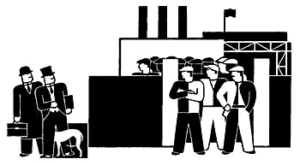 truth-out.org. September 2016. We live in ominously dangerous times. The world capitalist system — having fueled colonialism, imperialism and the constant intensification of labor power exploitation for roughly 500 years — now threatens the planet with an ecological collapse of unprecedented proportions. Unsustainable resource exploitation, water pollution (the transformation of lakes, rivers and oceans into garbage dumps) and massive economic inequality are at the root of the possibly irreversible collapse of industrial civilization. Meanwhile, however, too many of us remain caught up in abstract and ahistorical predictions of collapse that fail to offer an alternative realistic vision of a future socio-economic order.
truth-out.org. September 2016. We live in ominously dangerous times. The world capitalist system — having fueled colonialism, imperialism and the constant intensification of labor power exploitation for roughly 500 years — now threatens the planet with an ecological collapse of unprecedented proportions. Unsustainable resource exploitation, water pollution (the transformation of lakes, rivers and oceans into garbage dumps) and massive economic inequality are at the root of the possibly irreversible collapse of industrial civilization. Meanwhile, however, too many of us remain caught up in abstract and ahistorical predictions of collapse that fail to offer an alternative realistic vision of a future socio-economic order.
Simultaneously, the phenomenon of global warming, driven mainly by the dynamics and contradictions of a fossil-based economy, has prepared the soil for the eruption of new sources of conflict with the manifestation of historically unique destabilizing social forces. Climate change directly threatens billions of people and most other beings — besides the occasional cockroach, diadem or tardigrade — with outright extinction brought on by droughts, floods and other “natural” disasters.
Nonetheless, the catastrophic scenario sketched out behind the operations of global capitalism does not merely represent the other side of a wild socio-economic system bent on constant and abstract growth in pursuit of ever greater rates of profit. The so-called Golden Age of capitalism ended decades ago and the system has now run into a brick wall, as it appears to have reached a point where it is no longer capable of sustaining a constant momentum of growth to keep the economy reproducing itself at a pace that generates higher standards of living for the next generation.
Indeed, the productivity rates in the advanced industrialized regions of the world (such as the US, Europe and Japan) since the eruption of the financial crisis of 2007-08 are far slower than those of previous decades, thereby confirming the claims of various experts who argue that we have reached the end of the age of growth.
Moreover, in spite of all the talk about the marvelous and awe-inspiring accomplishments of the high-tech revolution, these innovations pale in comparison to the innovations of the Industrial Revolution. The new technologies reach billions of people, generating mythical fortunes for founders and investors, but increasingly employ only a handful of privileged workers. In the meantime, the problems of massive unemployment, increased inequality, growing economic insecurity, and dangerous levels of public and corporate debt are mounting.
In this context, the present crisis facing the world economy as a whole “consists precisely in the fact,” as Antonio Gramsci put it in his Prison Notebooks, “that the old is dying and the new cannot be born,” and all of the above represent the “morbid symptoms” of this antinomy that the great Italian revolutionary underscored as being part of this interregnum. Read more


